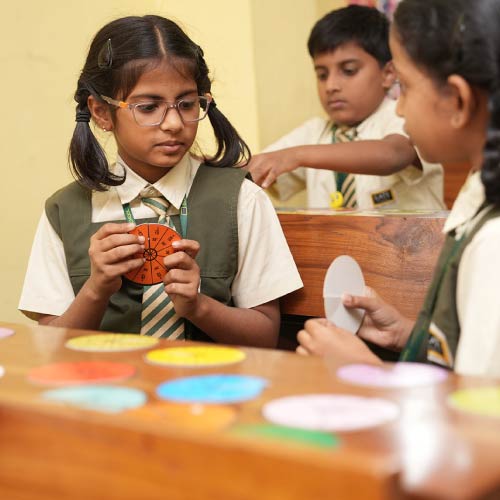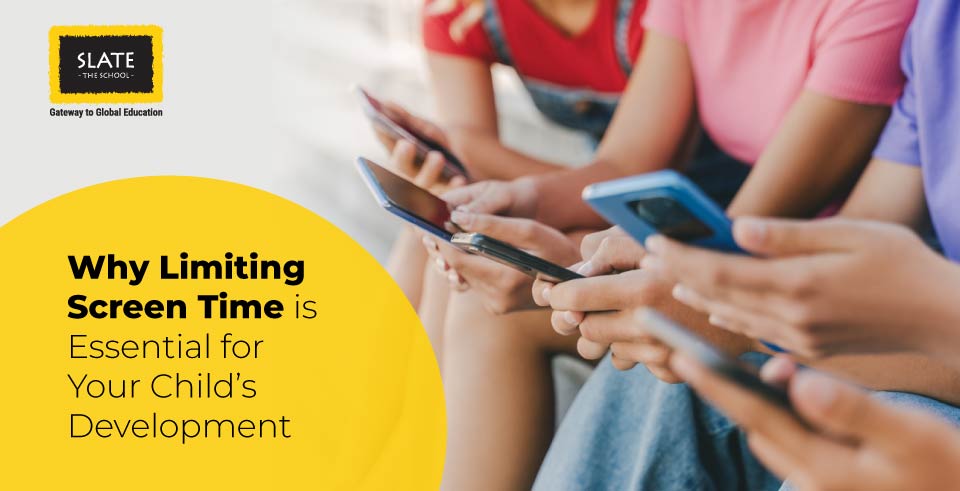In the digital age, technology is deeply woven into our lives. While screens offer convenience and connectivity, excessive screen time can harm children’s physical, mental, and social growth. Focusing on screen time and child development, this article explores the importance of maintaining a balance. It highlights how Slate – The School leads by example with its innovative smartphone-free policy. This approach promotes healthy habits, fosters a love for screen-free activities for children, and ensures that students grow into well-rounded individuals.
The Impact of Screen Time on Child Development
Managing screen time and child development is crucial because unchecked exposure can negatively affect various aspects of a child’s growth:

- Cognitive Development
Children thrive on interactive and real-world experiences. Excessive screen usage often replaces these essential activities, hindering the development of creativity, problem-solving, and critical thinking skills. - Physical Health
Long hours in front of screens lead to sedentary lifestyles, contributing to obesity, poor posture, and strained eyesight. Parents and educators must work together to reduce screen time for kids to support healthier routines. - Mental Well-Being
Screens can overstimulate young minds, leading to anxiety, stress, and behavioural issues. Prioritising healthy screen habits for children can mitigate these risks and create a more positive mental environment. - Social Skills
Interpersonal interactions are vital for emotional intelligence. Excessive screen time reduces opportunities for children to build relationships, emphasising the need to limit screen time for child development effectively. - Sleep Patterns
Blue light emitted from screens disrupts sleep cycles, negatively impacting focus and energy levels during the day. Encouraging screen-free activities for children before bedtime is a practical way to address this issue.
Slate’s Smartphone-Free Policy: A Blueprint for Balanced Growth

At Slate – The School, we believe that a balanced approach to technology is essential for raising well-rounded individuals. By implementing a strict smartphone-free policy, SLATE provides a supportive environment where students flourish without unnecessary distractions.
- Uninterrupted Learning
Limiting screen time for children allows them to stay focused on academics without interruptions. By removing smartphones from the equation, SLATE creates an atmosphere of concentrated learning. - Stronger Social Bonds
A lack of screens enables children to engage in meaningful conversations and collaborative projects. This policy fosters empathy and enhances communication skills, making screen-free activities for children an everyday practice. - Teaching Digital Discipline
Through the smartphone-free approach, SLATE instils healthy screen habits for children that extend beyond the classroom. Students learn to balance technology use, preparing them for a tech-driven world. - Enhanced Academic Results
Research indicates that reducing distractions improves academic performance. By encouraging students to reduce screen time for kids, SLATE helps them achieve better results in their studies. - Safety from Cyber Risks
The smartphone-free policy shields students from cyberbullying, harmful content, and excessive gaming, ensuring a secure and nurturing environment for learning and growth.
Benefits of Limiting Screen Time for Children

Restricting screen use offers a host of benefits that are integral to a child’s holistic development:
- Increased Physical Activity
When children spend less time on screens, they naturally gravitate toward physical activities like sports, cycling, and outdoor games. These activities promote fitness and overall well-being. - Enhanced Creativity
Engaging in screen-free activities for children, such as painting, crafting, or storytelling, nurtures imagination and innovative thinking. - Improved Focus and Attention
Limiting screen time for children allows them to concentrate better on tasks, enhancing their ability to absorb and retain information. - Stronger Family Connections
Reduced screen usage facilitates quality family time, from shared meals to fun activities. These moments help strengthen relationships and create lasting memories. - Better Emotional Stability
Children who engage in real-world interactions develop resilience and emotional intelligence. Limiting screen time for child development fosters these essential traits.
SLATERS: A League Apart
At SLATE, students, known as SLATERS, stand out because of their disciplined approach to screen use and their engagement in enriching activities:
- Confident Communicators
SLATERS excel in interpersonal skills, thanks to a focus on in-person interactions and collaborative learning. - Active Participants
Whether in sports, arts, or academics, SLATERS thrive due to their exposure to a balanced lifestyle that prioritises screen-free activities for children. - Tech-Savvy yet Disciplined
SLATE teaches students to embrace technology judiciously, ensuring they are prepared for the digital world while maintaining healthy screen habits for children. - Resilient and Adaptable
With a strong foundation in social, emotional, and academic skills, SLATERS are future-ready individuals who can navigate any challenge. - Holistic Achievers
By focusing on all-round development, SLATE equips students to shine in academics, extracurriculars, and personal growth.
Practical Tips for Parents
Parents play a pivotal role in creating a balanced environment at home. Here are some strategies to ensure limiting screen time for children effectively:
- Establish Clear Rules
Establish clear screen use rules by defining specific hours for device usage and designating screen-free zones like bedrooms and dining areas. While internet access at home is generally discouraged, if parents choose to allow it, a desktop should be placed in a common area for supervision, preventing unsupervised browsing. This approach promotes healthier habits and encourages family interaction. - Promote Physical Play
Encourage outdoor activities or hobbies that keep children engaged and active. - Be a Role Model
Demonstrate healthy screen habits for children by practising moderation yourself. - Engage in Family Time
Organise activities like board games, reading sessions, or cooking, ensuring quality family interactions. - Monitor Content
Keep track of what children watch to ensure it aligns with their developmental needs.
Also Read: Importance and Benefits of Parent-Teacher Meetings at School
Conclusion
Balancing screen time and child development is essential for raising well-adjusted children. At Slate – The School, our innovative policies, including the smartphone-free approach, showcase the benefits of a screen-conscious lifestyle. By promoting limiting screen time for children and prioritising real-world interactions, SLATE empowers students to excel academically, socially, and emotionally.

